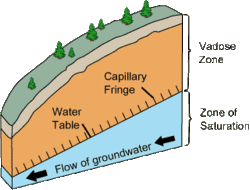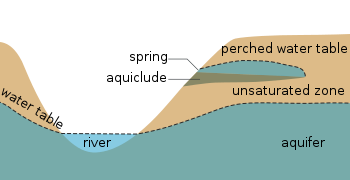
Back Nivell freàtic Catalan Phreatische Zone German Υδροφόρος ορίζοντας Greek Capa freática Spanish Põhjaveepind Estonian Maila freatiko Basque منطقه آباشباع Persian Nappe phréatique French Maoschlár Irish Nap freyatik HT


The phreatic zone, saturated zone, or zone of saturation, is the part of an aquifer, below the water table, in which relatively all pores and fractures are saturated with water. The part above the water table is the vadose zone (also called unsaturated zone).
The phreatic zone size, color, and depth may fluctuate with changes of season, and during wet and dry periods.[1][2] Depending on the characteristics of soil particles, their packing and porosity, the boundary of a saturated zone can be stable or instable, exhibiting fingering patterns known as Saffman–Taylor instability. Predicting the onset of stable vs. unstable drainage fronts is of some importance in modelling phreatic zone boundaries.[3]
- ^ "Phreatic Zone". TheFreeDictionary.com. Retrieved 7 June 2012.
- ^ "Phreatic Zone". Encyclopædia Britannica. Retrieved 7 June 2012.
- ^ Dynamics of Drainage and Viscous Fingering
in Transport in Porous Media
Note that zones "behind" the drainage front are areas on the 'dry' (low-viscosity) (typically above / beyond the 'wet' zone).